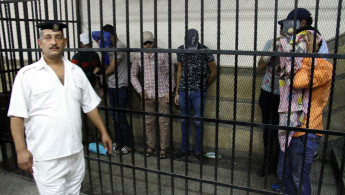Twitter #StopSlowKilling campaign targets Egyptian prisons
Egyptian human rights activists have launched the Arabic hashtag "Stop Slow Killing" in solidarity with sick prisoners, and to condemn the negligence rife within Egyptian prisons.
The hashtag was launched after the death of a prisoner on Saturday in Mansoura general prison in the northern Egyptian governorate of Dakahliyah. Activists have since demanded the immediate release and hospitalisation of all ill detainees.
Last week several prisoners in Mansoura prison petitioned human rights organisations for their help, complaining that the prison administration and Dakahliyah Security Directorate did not allow critically and chronically ill prisoners to be released for treatment.
They also blamed the interior ministry for their suffering.
| Adel Youssef Abdul Salam, 55, died from acute liver failure two days after signing the petition, after the prison guards refused him hospital treatment. |
Prisoners at Mansoura jail first signed the petition, including 55-year-old Adel Youssef Abdul Salam - who died two days later from acute liver failure, after the prison administration refused him hospital treatment.
Abdul Salam was arrested on 30 August 2013 during an anti-coup protest in Mansoura. He was sentenced to ten years in prison for protesting, blocking roads and chanting anti-police and army slogans.
Mohammad al-Sayed Younes is another prisoner who signed the petition. He has bladder stones and an enlarged prostate and urgently needs surgery. Hisham Mohammad Abul Fotouh who suffers from retinal atrophy also signed the petition, as did Sami Abdul Gawad al-Baqli who needs surgical screws for a knee that was fractured in prison four months ago.
Mohammad Talaat Shamis, another signatory, has a severe skin infection and possibly skin cancer - but the prison administration has reportedly so far refused him treatment. Another is Mahmoud Abdul Hadi, who suffers from a stomach ulcer.
Critics of prison administration systems say Egypt's security authorities have been using medical negligence to kill their opponents behind bars away from the public eye.
Official graveyards
On 12 December 2014, two days after Human Rights Day, the Egyptian Observatory for Rights and Freedoms (EORF) published a report titled Official graveyards [Ar], which focused on detention facilities in Egypt - including prisons, police stations, courts and prosecution offices.
According to the report, since 30 June 2013 a total of 212 detainees have been killed by torture, deliberate medical negligence, poor detention conditions, the spread of disease or a lack of ventilation. This includes 83 deaths since Abdul Fattah al-Sisi was inaugurated as president.
EORF's monitoring and documentation unit confirmed that Egypt's detention centres have become places to slowly drain prisoners of their mental and physical capacities.
This article is an edited translation from our Arabic edition.


![President Pezeshkian has denounced Israel's attacks on Lebanon [Getty]](/sites/default/files/styles/image_684x385/public/2173482924.jpeg?h=a5f2f23a&itok=q3evVtko)



 Follow the Middle East's top stories in English at The New Arab on Google News
Follow the Middle East's top stories in English at The New Arab on Google News


